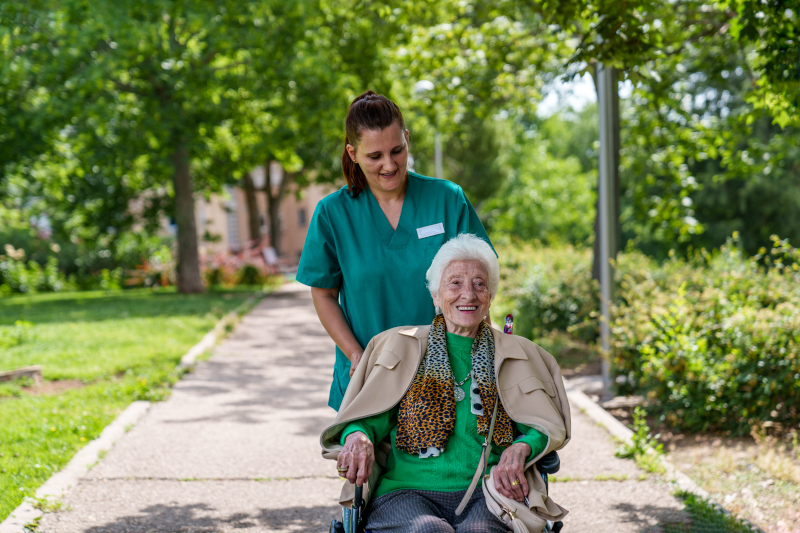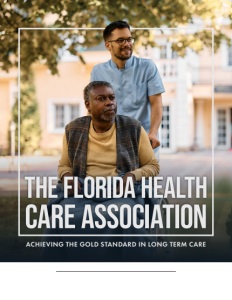How the Florida Health Care Association is Achieving the Gold Standard in Long Term Care
The Sunshine State has long been considered a destination for seniors to retire and spend their “golden years.” Florida is home to more than 5.5 million residents who are over the age of 60, and that number will only continue to grow. By 2045, it is estimated that over 30% of the state’s population will be older adults, making up 8.4 million of our residents.
Today’s seniors, compared to previous generations, are working well past the traditional retirement age, fueling the economy, and enjoying many more golden years given their longer life expectancies and a strong health care system to support them.
Over the past 70 years, there has been significant growth and development to ensure a high-quality continuum of care for aging Floridians. Florida leaders have prioritized the ability for seniors to age in the least restrictive, most comfortable, and most secure settings possible – but this does not come without its challenges and the demand for constant improvement and innovation.
Florida Health Care Association (FHCA), celebrating its 70th anniversary in 2024, has been an integral partner in establishing and maintaining the highest standards for long-term care in the state, and we continue to strive to remain the gold standard of care in the nation.
FHCA is a federation representing over 86% of the state’s 700 nursing centers. Our membership includes over 600 long-term care centers that provide skilled nursing, post-acute and sub-acute care, short-term rehabilitation, assisted living and other services to the frail elderly and individuals with disabilities in Florida. We also represent more than 400 business partners who provide value products and services to help Florida’s long-term care centers with meeting the needs of their residents.
Policies that support providers with continuous quality improvements, address a stable workforce, recognize the changing needs of the long-term consumer, and invest in technology and capital improvements to enhance quality care and quality of life are all key to ensuring that residents and their families have access to the gold standard of care they need and expect.

Strengthening our workforce
With the rise in Florida’s aging population, it will be critical for long-term care and public health programs to be prepared with the staffing and operational capacity to ensure access to the care and services available to those in need.
Workforce recruitment and retention is one of the most pressing challenges confronting Florida’s nursing centers and other long-term care providers today. The health care system has experienced a shortage of trained caregivers for critical roles for some time; nurses and nurse aides are among the fastest growing occupations, but supply is not keeping pace. The federal government estimates nearly 27 million people will need some kind of long-term care by 2050, magnifying the workforce shortage that already exists and has yet to bounce back since the COVID-19 pandemic.
Fortunately, Florida’s leaders recognized the importance of keeping pace, or rather catching up, with the growing long-term care labor demands. This year, the Florida Legislature and Governor Ron DeSantis approved a significant Medicaid funding increase to help nursing centers continue advancing quality care through a strengthened workforce.
The state budget provides an 8% increase ($247.8 million) in Medicaid funding, amounting to an average $470,000 per center, per year to support the state’s nursing centers with meeting the growing demand for qualified caregivers and the needs of Florida’s vulnerable seniors and people with disabilities.
In 2021, FHCA was awarded a $1.8 million grant from the federal Centers for Medicare and Medicaid Services (CMS) to strengthen Florida’s long term care workforce and attract more Certified Nursing Assistants (CNAs) into the profession through the CaregiversFL Career Program. As part of that program, an interactive website, Florida.carefortheaging.org, was developed to help job seekers access career opportunities in Florida’s long term and post-acute care profession.
FHCA also supports Florida’s long-term caregivers with advancing in their careers through the Florida Health Care Education & Development Foundation Scholarship Program. This year, FHCA awarded 29 long-term care employees across Florida a total of $70,500 in scholarship funds to help them pursue their career goals, which range from dietary management, nursing and healthcare administration. The Foundation has awarded over $250,500 to long-term care professionals since the association established its scholarship program in 2005.

Caring for those with Alzheimer’s
Florida currently ranks second highest in the nation for those aged 65 and older living with Alzheimer’s disease or related dementias (ADRD).
With over half a million ADRD residents in Florida, combined with the growing number of aging residents in the state, the need to continue providing quality long-term care for individuals is ever-increasing.
It is vital for caregivers to understand all aspects of ADRD and how to care for the residents afflicted by it. Proper education and training are necessary to ensure Florida’s long-term caregivers are prepared to meet this rising need with the highest quality of care.
Investing in technology for our future
Technology will lead the way in helping to fortify and streamline the operations and infrastructure in nursing centers across the state.
The use of Artificial Intelligence (AI) systems, for example, can help with enhancing quality by assessing patient medical records and clinician notes to supplement a caregiver’s routine by predicting changes in health conditions and preventing unnecessary outcomes.
Meanwhile, innovative products such as electronic lifts can aid CNAs with the physical demands of patient care, special air mattresses to keep patients moving to prevent pressure ulcers, or new and innovative therapy equipment to help residents rehabilitate and get back home faster are other examples of how new technologies can improve efficiency as well as patient outcomes.
Looking ahead
Our mission to find innovative solutions to improve care and overcome key challenges in the profession took the stage this July during the FHCA 2024 Annual Conference & Trade Show, the largest and leading long-term care conference in the southeast. This signature event featured five keynotes and 58 Continuing Education sessions, 280+ exhibits and several networking opportunities. Attendees learned from experts, made key connections, shared ideas and recognized the healthcare heroes who are making positive strides in quality every day.
Despite the challenges that exist in long-term care, Florida continues to outpace the nation in the standard of care provided to seniors and people with disabilities, as shown on FHCA’s Long Term Care Quality Dashboard. Florida is a leader in nurse staffing, ranking above the national median in registered nurse staffing and total daily nurse staffing hours, and ranking third among large states. Additionally, over 70% of care centers in Florida have earned a CMS 4-star or 5-star Quality Measures Rating, while 75% of nursing centers have been awarded one or more Quality Recognitions.
Through meaningful investments, innovation and collaboration, Florida can continue to offer gold standard care that meets the evolving needs of our state’s seniors and people with disabilities, promotes resident and family choice, supports recruitment and retention of long-term caregivers, and incentivizes centers to provide the highest quality of care.


